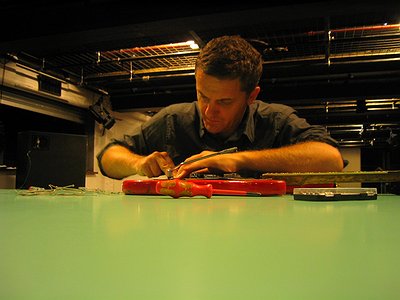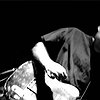Am I getting through?
Purportedly, John Stevens of the Spontaneous Music Ensemble had two basic rules to playing in his ensemble: (1) If you can't hear another musician, you're playing too loud, and (2) if the music you're producing doesn't regularly relate to what you're hearing others create, why be in the group. What's your perspective on this statement and how, more generally, does playing in a group compare to a solo situation?
I agree with John. Although simply because he proposes rules to the game, I would feel like breaking them immediately. I'm a little wary of rules in this particular game and if I have any rule myself it is to find the right people to play with. I don’t believe that because the music is improvised that the musician can just play with anyone. Improvising in itself is no virtue and the act alone has no intrinsic value, there is as much bad improvised music out there as there is bad commercial pop music. Some great improvisers I know just don't work well together and the music they can produce together can be unlistenable. Listening is often cited as a prime rule, but even that is not necessarily a recipe for success. And how to judge who is listening and who is not, can often be a very subjective experience, even if you play with a musician who you are convinced is not listening, some great music can emerge. And likewise if you feel someone is listening to your every note and following you, it can be extremely annoying. I try not to think too much about what I'm doing when I improvise and simply use my ears and intuition.
I would agree with Ken Vandermark who recently said if he begins to think too much about what he is doing and begins to play in a more strategic way, it is not really the ideal situation for improvising though in some cases it may be necessary.
Some people see recording improvised music as a problem. Do you?
No, on the contrary. There’s two good reasons to record improvisations. One for your own private use to listen back and hear what happened - you can learn a lot from that. If it's recorded well you hear a more balanced version maybe closer to how the audience heard it and you can figure out a lot of things like how you deal with time, tension, space and you can observe repeating habits that you have that you may or may not want to break.
The other reason of course is to release it as a CD. I personally do not listen to a lot of improvised music on CD, I prefer the live experience but I know many people who do enjoy listening to them. I don't have a purist attitude towards editing or selecting either. Put your best stuff on the CD and dump the noodling meandering crap - it's your music and whether it's carefully composed songs or wild and free improv, there will be good material and bad material and why would you want to inflict the bad material on your listening audience. When I choose material for a CD from an improvised concert or a series of concerts, I select the material that I like or in a group situation, the music that we all like if we can agree. I'm not going to put music out there that I don't like myself. There's plenty of music out there already that I dislike why would I add to it?
In the 20th century, the relationship between music and other forms of art - painting, video art and cinema most importantly - has become increasingly important. How do you see this relationship yourself and in how far, do you feel, does music relate to other senses than hearing alone?
Last year I was invited by an association called INTERMÈDES GÉOGRAPHIQUES to create some music for people to listen to while travelling on a train. It was a one specific route from Besancon in eastern France to La Chaux Fonds just inside the Swiss border. The passenger /listener was provided with an mp3 player at the start of their journey and at each station a new piece of music would begin, triggered by GPS. I made the music, at least the first sketch, by watching a film of the train journey and improvising for the full 98 minutes, stopping at each station and beginning a new piece when the train took off again. It was a great way to improvise. later I edited the pieces and selected some other pieces I had already made that worked well in some sections. Musically I was on alone but I was working with the rhythm and tempo of the train and the images coming at me and the amount of time between each station varied a lot so I had to really slow down and give myself space and time. It was a great exercise for me, as my attention span is short and I move quite quick between ideas and this forced me to stay on one idea or sound longer and develop them slower. It didn't always work. Some of the pieces were too slow and boring when I listened back to them without the images, but as soon as I watched the film with the music it made sense again. This was an important lesson for me.
In how much, do you feel, are creative decisions shaped by cultural differences - and in how much, vice versa, is the perception of sound influenced by cultural differences?
Wow an impossible question. How much? When we play with Getachew, the goal posts move. The whole game is different and really fun, we're playing in very specific Ethiopian scales and if we move out of that scale by one note he refers to it as 'broken sound ' . A beautiful way of describing it in this case is that it doesn't feel like you're just playing a duff note, it feels like your breaking the magic and power of the music. On the other hand in the same band we do some wild, scratchy discordant solos and Getachew loves it. He loves the energy and the force and the enthusiasm of it. He is an amazingly flexible and open musician. He must be, to have invited The Ex to be his band. I'm sure he hears the music very differently from us but we found a common language. In fact, we had to find some kind of language to communicate because he speaks very little English and us even less Amharic.
Do you feel it important that an audience is able to deduct the processes and ideas behind a work purely on the basis of the music? If so, how do you make them transparent?
I don't really think in these terms, in my case it's very transparent what I do and to most guitarists probably looks quite easy. I'm happy if someone sees what I do and thinks "hey I can do that". My focus is not so much on technique and skill as it is the transmission of ideas and finding a personal voice. Studying technique for me gets in the way of this process. I try to communicate ideas, thoughts and emotions through my music but I don't have any idea what gets through as I don’t discuss it very much with the audience afterwards. But I can feel if they get it or like it or don't get it.
As far as recorded music goes I think it can amplify and animate the whole listening experience if the artist gives information about how the music was made, whether it was completely improvised, a live concert or a composed piece. I like to know this when I listen to music, though ultimately it probably won't change whether I like a piece or not. I don't see improvisation as a virtue in itself. There's a lot of terrible improv out there and there's a lot of terrible music out there. Full stop. Far, far more than there is good music.
Usually, it is considered that it is the job of the artist to win over an audience. But listening is also an active, rather than just a passive process. How do you see the role of the listener in the musical communication process?
When I perform there is a part of me that wants to win over the audience. At least I want them to feel something, be it negative, positive, emotional, intellectual. We don't make it easy for our audience, we do what we do and play what we consider to be good music. If the audience is with us on that or some of the audience is, it definitely effects our performance. But I don't expect the audience to work as hard as me, the musician. If they are not listening at all or standing at the bar and talking, that can be irritating and disheartening but I feel like I am there to give as much as I can. I do feel like it's my goal to get through to them. All they have to do is listen and watch. That's not exactly passive but it's not too difficult a task to expect of your audience.
Music-sharing sites and -blogs as well as a flood of releases in general are presenting both listeners and artists with challenging questions. What's your view on the value of music today? In what way does the abundance of music change our perception of it?
It makes me realise that there is in fact some incredible music out there that I may never have enough time in my life to listen to at any depth. There are some pieces of music that I know I need to listen to a 100 times to get really close and deep into what the artist is trying to give . I've listened to some Mingus tunes at least a 100 times and still discover and feel new things. Having easier access to all this music gives us more of a chance to listen to new things but it doesn't give us the actual time we would need to appreciate all of this, so there is something cruel about it. Like a recurring dream I have where I am in a giant supermarket full of incredible food which I can take for free but all of it is somehow out of my reach and I can't manage to carry anything. The value of music for me, the music that I love, is an incredible treasure that brings immeasurable joy into my life. I'm not sure how to put a value on that. I definitely have listened to more different kind of music in the last 10 years than the previous 40 because of its accessibility, but for me, the stuff that I like still ends up being a tiny fraction of that, and that, is where the value lies.
Please recommend two artists to our readers which you feel deserve their attention.
Ab Baars - tenor sax, clarinet
John Butcher - tenor sax, clarinet






